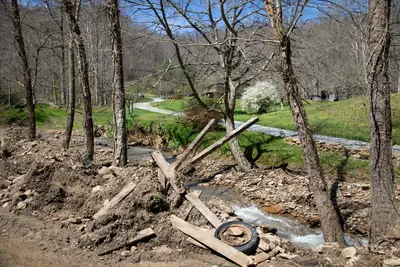How Bankruptcy Helps Coal Industry Avoid Environmental Liability — ProPublica
Whenever a hard rain fell on Harlan County, Kentucky, the mud, rocks and debris from the Foresters No. 25 mine pounded down the hillside into the community of Wallins Creek.
Local residents repeatedly complained about washed-out culverts and mud in their yards. Time after time, county work crews came out after a heavy rain to repair Camp Creek Road, a water line that runs alongside it and a local bridge. The strip mine’s owner, Blackjewel, fixed some problems, but when the rains came again, so did the muddy flooding.
Amber Combs, who lived down the hill from Foresters, recalled a day in August 2017 when “the water was rushing down and the yard was a muddy slush pond. It was literally like a river around my house.” Combs complained to Kentucky regulators, who fined Blackjewel $1,300, which it never paid. Overall, under Blackjewel’s ownership, Foresters would run up 17 violations and more than $600,000 in unpaid fines.


Credit:
Silas Walker/Lexington Herald-Leader
Founded in 2008 by West Virginia native Jeff Hoops, Blackjewel grew in just a decade to become the sixth-largest coal producer in the U.S., partly by accumulating mines like Foresters that had gone bankrupt. By 2018, it boasted more than 500 mining permits in Kentucky, Virginia, West Virginia and Wyoming. Then, in July 2019, Blackjewel stunned the industry by declaring bankruptcy, with claims against it later estimated at $7.5 billion.
That December, environmental groups where Blackjewel operated warned the bankruptcy judge that, while he was focusing on what they called the company’s “significant financial mismanagement,” he should also be aware of “severe environmental mismanagement problems.”
“Reclamation work, water treatment, and other expenses related to environmental compliance should be approved and prioritized” in the bankruptcy case, the environmental advocates wrote.
Kentucky regulators agreed. But, citing longstanding case law, the judge rejected their request. Instead, bankruptcy trustees began divvying up the company’s assets among preferred creditors such as banks and hedge funds. Problems at Foresters and other Blackjewel sites persisted. By mid-2020, there were more than 600 outstanding violations of state mining and reclamation standards at the company’s mines in Kentucky, including 450 since the bankruptcy filing. On top of that, regulators had cited Blackjewel mines for more than 13,000 violations of Kentucky water quality rules, mostly for failing to monitor pollution discharges.
The Blackjewel case, still unresolved and nearing its fourth anniversary this July, highlights the environmental toll of what has become a central feature of the coal industry’s business strategy: bankruptcy. Over the past decade, Blackjewel and other coal companies have found two ways to use bankruptcy to their advantage. First, they expanded their holdings by acquiring other companies’ bankrupt mines, which they hoped would turn a temporary profit during upticks in coal prices and production within the industry’s long-term decline.
Then they declared bankruptcy themselves, entering an arena where they didn’t have to pay all of their debts, and where environmental liabilities took a back seat to banks and other financial creditors. As more coal companies busted, hundreds of mines cycled through repeated bankruptcies. Some, like Foresters, are no longer producing coal, yet they continue to pollute their communities.

Credit:
Luke Sharett/Bloomberg via Getty Images
A first-of-its-kind analysis by ProPublica and Mountain State Spotlight has documented that mines that have gone through multiple bankruptcies also tend to…
Read More: How Bankruptcy Helps Coal Industry Avoid Environmental Liability — ProPublica

